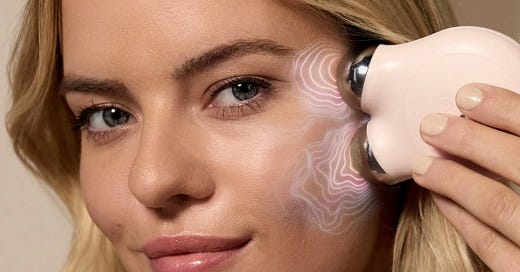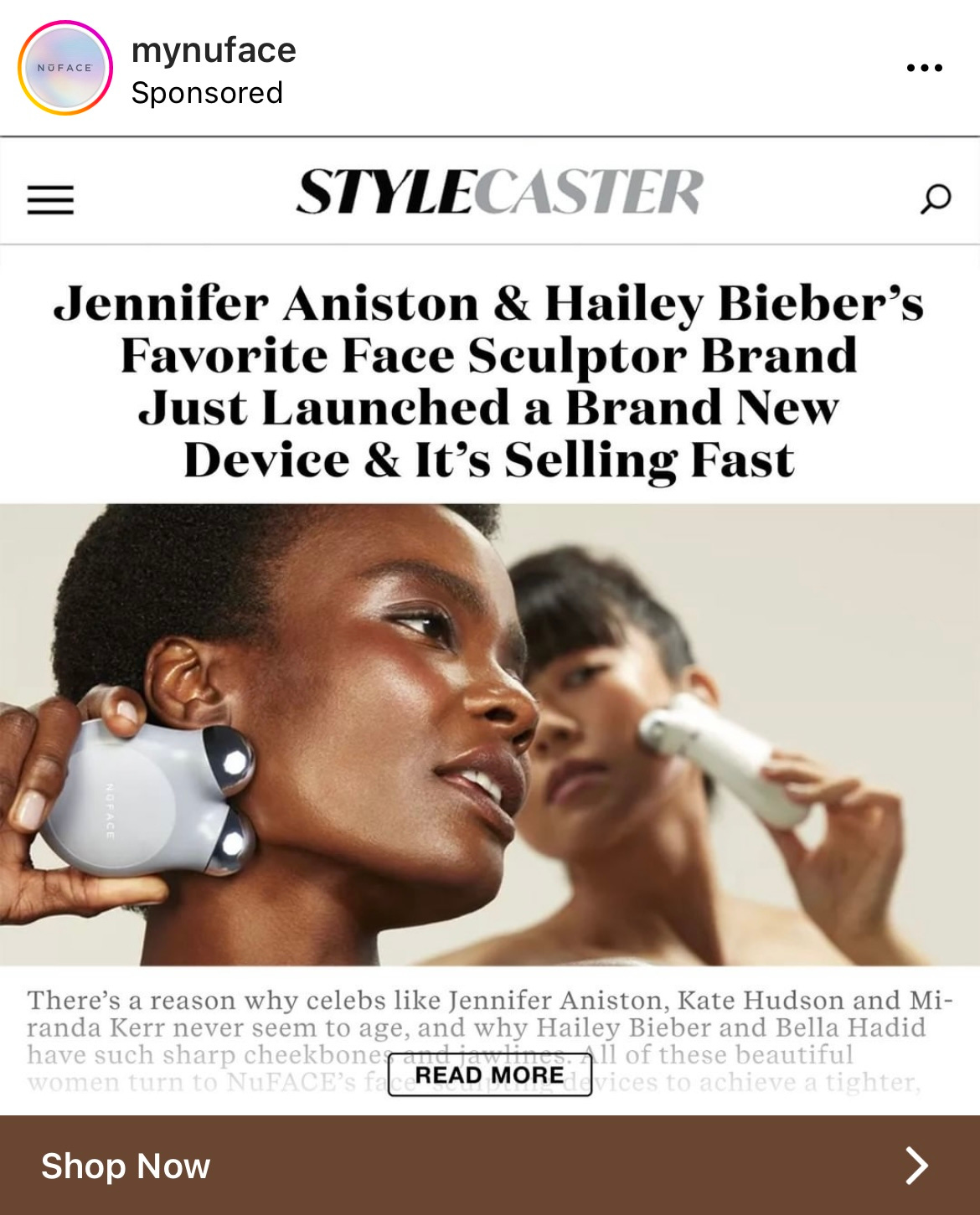There’s a reason why celebs like Jennifer Aniston, Kate Hudson and Miranda Kerr never seem to age, and why Hailey Bieber and Bella Hadid have such sharp cheekbones and jawlines. All of these beautiful women turn to… SHOP NOW.
I recently went on a terrible little internet journey that began with an ad on Instagram for the NuFACE microcurrent device. I’ve seen the device on TikTok and I’ve seen it promoted by influencers on YouTube, so I’m not shocked it made the jump to my Instagram feed. I did some bitter scrolling on the company’s account and here’s what I learned: “Beauty is Muscle Deep.”
The skincare boom of the last several years has been lauded as a healthy development, a progressive movement away from using makeup to mask our supposed imperfections, but to me it feels much worse that I’m expected to fix those imperfections now. It’s not enough that I look good once I’ve done my makeup and left the house for the day — I have to look good under my makeup, under my skin. I have to look good when I’m alone, right when I wake up and as I’m going to bed, I have to look good always.
The shift from artificial to natural beauty — think “no-makeup makeup” and “clean girl makeup” — has normalized perfect skin and made normal skin seem pathological. Dryness and oiliness, blemishes and scars, uneven texture, wrinkles and looseness, whatever the fuck “dullness” is — these are all normal features of healthy skin and yet they’ve been made into abnormalities that must be treated.
The natural beauty imperative has also made unprecedented levels of beauty work seem normal. Beauty work is going deeper, becoming more invasive and more expensive, and frankly, less fun. Botox, lip injections, nose jobs, liposuction, and BBLs have exploded in visibility in recent years. Today I saw a headline that read “Want to look good the moment you roll out of bed? Try permanent make-up”. The standard for beauty has shot so high that women are going to extreme lengths to get closer to it, and this exhausting and sometimes painful labor of body manipulation is often spun as an act of self-love rather than self-hate.
The toxicity of the natural beauty messaging that has accompanied the skincare boom is visible in the images used to promote products like the NuFACE device. You have the airbrushed model in a full face of makeup holding the device and smiling as if she just learned the secret to eternal happiness, and then you have the before-and-after mugshots of “real women” whose glum faces are meant to prove the efficacy of the product.
Some infinitesimal difference in the contours of their makeup-less faces are meant to justify a $400 purchase and four months of beauty work. But when we go about this work, we’re still comparing ourselves to models and celebrities who are professionally makeup-ed, professionally photographed, and digitally sculpted and smoothed by professional editors.
We also see the conflation of “good skin” with youth and thinness. A product like the NuFACE device technically exists in the skincare category, but how is “face sculpting” skincare? The models and celebrities and influencers with sculpted faces are usually thin, so their jawbones and cheekbones are sharply defined anyway, and they’re young, so they already have “firm” and “supple” skin. The NuFACE Instagram account tells me the first signs of aging can appear on my skin around age 25. “NuFACE Microcurrent Technology can be used proactively to tone deep down to the muscle and slow signs of aging,” reads the post. Another post says, “Exercise Your Facial Muscles: Just like the rest of your body, if you exercise your facial muscles, it will tone and firm them—giving them a lift, adding volume to reduce sagging.”
So, my nightly skincare routine needs to cleanse, tone, treat, moisturize AND halt the ceaseless march of time AND make my face lose five pounds. The skincare industry’s latest ploy of sculpting the face and firming its muscles merely deepens the fatphobia and ageism already rampant in beauty culture.
At the end of the day, beauty culture and diet culture are two sides of the same coin. Jessica Defino, who writes the incredible Substack The Unpublishable, wrote in the below essay that the beauty standard isn’t a singular perfect image but a range of acceptable features. “The boundaries of that range are renegotiated and redrawn and repositioned as time passes, as the political landscape changes, as popular culture evolves,” but “rarely are they widened,” she wrote. Defino observed that the mainstream media and social media are awash with anti-diet culture and body acceptance messaging, but “as body-critical messaging slowed down, skin-critical messaging ramped up to replace it.”
Beauty culture’s obsession with the skin rather than makeup or hair or nails or clothes means that mainstream media can promote body positivity while continuing to use harmful diet culture language about body control. These days, influencers would be eviscerated in their comments if they promoted weight loss programs, yet they talk about cutting out dairy and gluten and sugar to cure their acne, drinking celery juice for glowing skin, using microcurrent devices and other tools to achieve snatched cheekbones. These are just diet culture buzzwords re-directed at the face since it’s not acceptable to hate your body anymore.
In a 1990 essay called “Postscript on the Societies of Control,” Gilles Deleuze wrote that the twentieth century has seen the societies of discipline theorized by Michel Foucault and other philosophers give way to societies of control. Societies of discipline are organized into institutions that enclose people: a child adheres to the rules of the nuclear family to avoid punishment; the child then moves through the institutions of the school, the military barracks, the factory, possibly the prison, feeling constrained by the same principle. Deleuze wrote that the structural integrity of these institutions is shaking as people pursue freedom and independence, that the control they exert is becoming boundless as they dissolve. This free-floating control, control that invisibly follows people as data and records rather than encloses them as physical walls, defines our present society.
“Enclosures are molds, distinct castings, but controls are a modulation, like a self-deforming cast that will continuously change from one moment to the other, or like a sieve whose mesh will transmute from point to point,” Deleuze wrote. Beauty culture and diet culture operate as such controls. Women have more freedom, more access and more power than ever before, but the “beauty backlash”1 has ensured that the doors supposedly open to us are guarded by ever-transmuting sieves.
When there was progress with one beauty parameter, when we were told we should delete the calorie-tracking apps and accept that ~all bodies are beautiful~, the other parameter narrowed to keep us constrained. Now we’re downloading an app that connects to our microcurrent face-sculpting device, we’re shelling out for Botox beginning at age 28 instead of 38, we’re adding another skincare product to our Amazon cart every time Hailey Bieber opens her mouth. The imperative of total body control follows us wherever we go, whatever progress we make. It follows us across social media platforms and IoT devices, from our not-firm-enough thighs to our not-firm-enough face, from the surface to the ugliness lurking below. The labor of self-monitoring and self-optimizing can’t stop, it can only change focus.
When I was doom-scrolling the NuFACE Instagram, I came across a post that simply said, “SUCCESS COMES FROM WHAT YOU DO CONSTANTLY.”
After scrolling on the NuFACE account and getting myself properly pissed off, I decide to make myself more pissed off by clicking through to STYLECASTER, a digital publication I had never heard of but one that clearly subsists entirely on celebrity SEO and product links. The headline “Jennifer Aniston & Hailey Bieber’s Favorite Face Sculptor Brand Just Launched a New Device” got me thinking about how every feminine-presenting celebrity is deputized in our body-control society. Instead of being disciplined by our fear of an authority figure and the punishments they dispense at will, we are now disciplined by love — love and envy — of our authority icons.
I searched Hailey Bieber’s name on the site and was served up a hundred of the most brain-rotting headlines I’ve ever seen: “Hailey Bieber Turns to This Nourishing Face Cream When Her Skin Acts Up—& It’s 30% Off.” “Hailey Bieber's Instagram Posts Are A Foolproof Guide To Fall Fashion.” “Hailey Bieber Swears By This TikTok-Viral, Anti-Aging Face Sunscreen On Sale for Prime Day.” The influencer class exists because Amazon wants you to be shopping constantly. Success comes from constant consumption, constant beauty labor. Capitalism wants you to feel ugly so that you’ll spend all your money and free time finding the right vitamin C serum instead of pursuing joy, power, wisdom, orgasms, education, liberation, sisterhood, love, peace…
At the end of Deleuze’s “Postscript,” he wondered if new forms of resistance will emerge to challenge the “progressive and dispersed installation of a new system of domination.” He wrote, “Can we already grasp the rough outlines of these coming forms, capable of threatening the joys of marketing? Many young people strangely boast of being ‘motivated’; they re-request apprenticeships and permanent training...
“It’s up to them to discover what they’re being made to serve, just as their elders discovered, not without difficulty, the telos of the disciplines. The coils of a serpent are even more complex than the burrows of a molehill.”
The secret genius of those bewildering STYLECASTER headlines is that they show beauty culture’s hand. It is clear as day what the buy-in is — click this link and buy this product — which means there’s a tangible opt-out. We must learn how to stop buying what they’re selling.
Naomi Wolf used this phrase in her book The Beauty Myth. “Western economies are absolutely dependent on the continued underpayment of women,” she wrote. “An ideology that makes women feel ‘worth less’ was urgently needed to counteract the way feminism had begun to make us feel worth more.”








